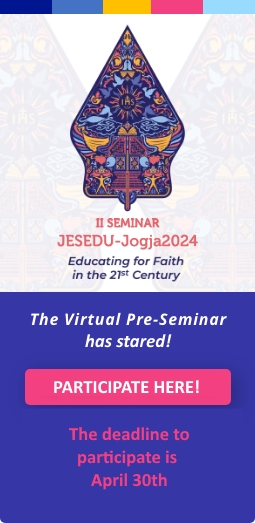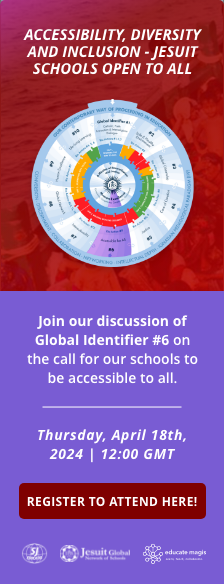OUR advocacy, at all levels of education, is a person-centered curriculum—meaning we are teaching persons. The subject that we teach is not for the sake of the subject itself, but is a basis for further learning applicable to life’s many intertwining facets. Human endeavor may draw success from any one or more of these facets, multiple intelligence considered. Multi-disciplinarity presents connections among disciplines heretofore unknown. Whether the subject we teach is in general education, a major or an elective, the purpose of teaching a subject is to foster full personhood of our students enabling them to render service to society. Serving others right is truly serving Him.
Person-centered curriculum and discernment
Person-centered curriculum centers “on the person rather than on the material to be covered.” We allow our learners “to develop and to accomplish objectives at a pace suited to individual ability and the characteristics of his/her own personality” (Characteristics – Jesuit Institute). A person-centered curriculum contributes to the fullest measure of having students learn to acquire knowledge and to understand what they have acquired such that their learning becomes the anchor for decisions they have to make. Ready for college, they seek information about labor demands. After reflecting within a network of attendant conditions on the possible outcomes of their decision, they decide what degree program to take. Decision-making continues daily in and outside of classes. Most of the time, they answer their own questions—through reflection. “How do I present my report using power point? How do I organize my essay? Which theories best support the conceptual framework of my research? These decisions have their own value. Decisions deemed valuable need not be earth-shaking. Daily decisions are as important, simple as they are. When piled up, they foster a discerning mind, a staunch hope. “Even small choices can shape our lives, though we may not know it. Especially small choices that we repeat, over and over again, can lead to habits, form attitudes, and push us in a specific direction that shapes larger events. This is another motivation for seeking God’s will in everything, in daily life”(Characteristics – Jesuit Institute).
 Magis and person-centered curriculum. What about magis? Is it relevant to the person-centered curriculum? Yes, indeed. Magis, Latin for “more” or “better” is related to “Ad majorem Dei gloriam, (‘For the Greater Glory of God’). Magis refers to the philosophy of doing more, for Christ, and therefore doing more for others,” as St. Ignatius in his Exercises expressed. It keeps us asking “What have I done for God? What am I doing for God? What MORE can I do for Him?
Magis and person-centered curriculum. What about magis? Is it relevant to the person-centered curriculum? Yes, indeed. Magis, Latin for “more” or “better” is related to “Ad majorem Dei gloriam, (‘For the Greater Glory of God’). Magis refers to the philosophy of doing more, for Christ, and therefore doing more for others,” as St. Ignatius in his Exercises expressed. It keeps us asking “What have I done for God? What am I doing for God? What MORE can I do for Him?
In this finite world, doing what He wills is through our daily actions. The usual Pinoy expression “This is enough; this will do” does not apply to magis. Regardless of what name one’s God is—Allah, Bathala, Yahweh—we, who believe in a Supreme Being and created in His likeness, in whatever we do, as in teaching and learning, should ask “What more can I do? How else can I better do what I am supposed to do?” Thus, magis draws as to excellence. Magis is no ivory tower. Magis draws learners to fully help shape a better world—the ultimate purpose of which is for His greater glory. Shaping a better world calls for the full development of one’s personhood—the full flowering of our God-given talents. The dynamics of how our personhood deals with this world calls for discernment.
Magis and discernment. The pursuit of MORE in magis provides sustainable and healthy discernment of truth and goodness. In a world of blatant social injustice, discernment will teach us to defend the cause of the poor. In a world of consumerism, discernment will teach us to choose a simpler life. In a world of egoism, discernment will urge us to demonstrate concern for others (Characteristics – Jesuit Institute). In a world of so much deception due to dire need for life’s basics or simply greed, we need discernment to temper our human cravings. Magis expects us, teachers, to have our students do their utmost best even as we ourselves do so as teachers. How to inculcate Magis? Given course requirements—foster in our students precision, thoroughness, attention to detail, logic, the ability to discriminate between what is necessary and what is not—in short, a habit of mind that can reflect and arrive at discerning truth from falsehood, from temperance to abuse. In a finite world, MORE of magis refers to the golden mean, to moderation.
In sum, to discern is to “ask questions, not judge easily, learn from experience, not repeat mistakes, trace problems to their causes;” as it were, “untying a knot, separating the various pieces until the knot is loosened, the problem solved.” Discerning is discriminating between “good from bad or fact from fiction.” Discernment helps us arrive through faith and prayer “at the proper understanding of a situation,”, “the deeper meaning of why things happen.”
 TERESITA TANHUECO-TUMAPON is one of the most accomplished institutional management experts in the Philippines, she held top academic positions at Xavier University (the Ateneo de Cagayan) before heading chartered institutions. She attended topmost universities in the Philippines, Germany, Great Britain and Japan. An internationalization consultant on call, she is journal copy editor of, and Graduate Studies professorial lecturer at, the Liceo de Cagayan University. Awards include a Lifetime Professional Achievement Award from the Commission on Higher Education and recently, the Order of Merit of the Federal Republic of Germany (Verdienstorden der Bundesrepublik Deutschland). Contact: ttumapon@liceo.edu.ph
TERESITA TANHUECO-TUMAPON is one of the most accomplished institutional management experts in the Philippines, she held top academic positions at Xavier University (the Ateneo de Cagayan) before heading chartered institutions. She attended topmost universities in the Philippines, Germany, Great Britain and Japan. An internationalization consultant on call, she is journal copy editor of, and Graduate Studies professorial lecturer at, the Liceo de Cagayan University. Awards include a Lifetime Professional Achievement Award from the Commission on Higher Education and recently, the Order of Merit of the Federal Republic of Germany (Verdienstorden der Bundesrepublik Deutschland). Contact: ttumapon@liceo.edu.ph
(Thanks to Rev. James A. O’Donnell, SJ, my former boss at XU and lifetime friend—for an assured understanding of Ignatian magis and discernment.)
This article was republished with the permission of the author and it first appeared in The Manila Times on March 31st, 2017.

